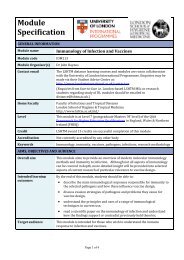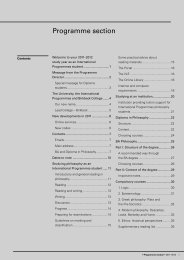Principles of sociology - University of London International ...
Principles of sociology - University of London International ...
Principles of sociology - University of London International ...
Create successful ePaper yourself
Turn your PDF publications into a flip-book with our unique Google optimized e-Paper software.
21 <strong>Principles</strong> <strong>of</strong> <strong>sociology</strong><br />
40<br />
Stop and think for a moment<br />
Can you think <strong>of</strong> some factors that might influence a researcher’s choice?<br />
As I said in Chapter 1, it is helpful to begin thinking about an area before<br />
you start reading about it. So try Activity 2.1 below. It is important to look<br />
carefully at this example because we are going to be using it in different<br />
ways throughout this chapter.<br />
Activity 2.1 Researching students taking <strong>sociology</strong><br />
Your local university has asked us to do some research on students studying <strong>sociology</strong> as<br />
part <strong>of</strong> their degree course. They want some answers to four questions:<br />
• What do students think about taking <strong>sociology</strong>?<br />
• Why are there such wide variations in the grades <strong>of</strong> <strong>sociology</strong> students?<br />
• Is there a relationship between students’ social backgrounds and their <strong>sociology</strong><br />
grades?<br />
• How do students from different social backgrounds relate to each other in<br />
<strong>sociology</strong> classes?<br />
Write down how you could study these problems. Identify the options that are open to<br />
you. Think which ones you might choose and why. Can you see any possible problems<br />
with the approach you have chosen?<br />
Some <strong>of</strong> the most important influences on researchers’ choices <strong>of</strong> design<br />
and method are:<br />
• The nature <strong>of</strong> the problem being investigated. Some research<br />
techniques are more appropriate than others to particular research<br />
problems. For example, researching the distribution <strong>of</strong> income in a<br />
whole society will require a different research design and different<br />
methods from a project exploring how a particular organisation works.<br />
• Practical considerations. The researcher must work out what<br />
is possible in terms <strong>of</strong> such things as the amount <strong>of</strong> time and money<br />
available, access to sources <strong>of</strong> data and the requirements <strong>of</strong> those<br />
funding the research.<br />
• Existing research. Much research is undertaken to extend, check or<br />
question existing work in the field.<br />
• Theoretical considerations. Sociologists have different theoretical<br />
ideas about the nature <strong>of</strong> human societies and the best ways <strong>of</strong><br />
generating knowledge about them, and these theoretical preferences<br />
influence their choice <strong>of</strong> research methods.<br />
The consequence <strong>of</strong> these choices and constraints is that there is no single<br />
‘correct way’ <strong>of</strong> doing sociological research. Rather there are a number <strong>of</strong><br />
different ways, each with their benefits and costs and their advocates and<br />
critics. Therefore, understanding sociological research, and giving good<br />
answers to ‘theory and methods’ questions, involves being able to compare<br />
and contrast different approaches. This involves the active learning talked<br />
about in Chapter 1.<br />
This critical thinking means that <strong>sociology</strong> students learn to look for<br />
‘the story behind’ the data. For example, rather than simply taking a set<br />
<strong>of</strong> statistics at face value and trying to explain it, as economists tend to<br />
do, sociologists ask questions about how it was collected and how much<br />
confidence we should have in it. This critical evaluation <strong>of</strong> data is not only<br />
valuable in <strong>sociology</strong>, it can also be applied to most <strong>of</strong> the other subjects<br />
you will study. Sociology teaches us that nothing should be taken for<br />
granted, nothing is quite as it seems. When confronted by some data, the
















